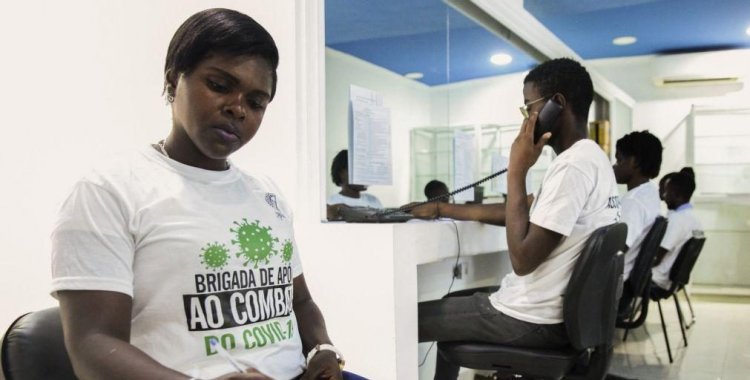"We were already volunteering in the [Luanda] neighborhoods, we dealt with people in places where the energy is lacking, where people hardly have access to the TV news and we realized that the message was not reaching those people," told Lusa Manuel Castanho, who leads the Nova Fénix volunteer association.
The company manager began by making information leaflets on safety procedures and practical advice on how to make bleach disinfectant to replace alcohol gel, but quickly realized he would have to move on to a new phase.
"Everyone was telling us he was calling the national emergency number - 111 - and couldn't get an answer because the number was down, which is understandable" in the face of the overload that emergency lines suffer "when there are too many nerves".
Last week, authorities even launched an appeal to citizens to avoid a collapse of the system after registering more than 90 percent of invalid calls to line 111, used for emergencies and public safety and reports of suspected cases of Covid-19, a disease caused by a new coronavirus.
Manuel Castanho then decided to launch his own call center to help clarify people: "We bought the numbers and phones, trained our volunteers and started clearing up doubts".
Among these are questions about disinfection procedures for quarantine doubts, says Manuel Castanho, a fireman in Portugal who has volunteered in various emergency scenarios and international disasters.
The 30 volunteers who now support him distribute leaflets in the neighbourhoods and receive the calls, divided into two shifts.
Currently, the call centre only works between 8am and 6pm due to the lack of space and equipment to receive more people, not least because Manuel Castanho takes the biosecurity rules very seriously.
Visitors and volunteers do not enter without first being measured the temperature, they sit following the recommended distance and have materials for hand sanitization and disinfection of the space on a regular basis.
As for the main questions of callers, questions about where to buy alcohol gel or complaints about exorbitant prices were frequent at first.
"We're getting information about companies that are speculating in a ridiculous way and we refer cases to INADEC (National Institute for Consumer Defence)," Manuel Castanho said, adding that volunteers give tips on how to make home disinfectants and advise the frequent use of water and soap.
But since the first cases of infection were identified, all concerning passengers who returned from Portugal between 17 and 19 March, just before Angola closed its borders, everything has changed.
"From the arrival of flights, the picture has changed completely: we've had calls for complaints and people worried about symptoms. There was a certain alarm and we make a point of transmitting calm because the panic is not in anyone's favour", he reported.
In the first days, "it was terrible", continues Manuel Castanho.
Many had seen people coming from flights in the street, others believed they had neighbours with Covid-19. Manuel Castanho therefore decided to start screening for any suspicious cases, checking for inconsistencies, before forwarding the information to 111.
The call center's chief advocates that volunteering should work in conjunction with the state and has maintained close contacts with the government at provincial level and with health authorities such as the World Health Organization.
"Our intention is this: to have someone else help the means that are made available by the government and pass information on to the people," he stresses.
Manuel Castanho even considers that volunteering is one of the biggest defence mechanisms that any country can have.
"We need more numbers. When they start to increase the number of cases, when they realize that we really need to go into quarantine, people will get scared and we need to enlighten people," he said, pointing to the importance of having more volunteers to combat misinformation.
"This is not an exercise, we are fighting a war against an invisible enemy and people need to be aware of that", he warns.
An "unequal" war that becomes even more difficult to wage in the overpopulated and unhealthy neighbourhoods of Luanda where the lack of water is frequent and many of the houses run out of power for days on end.
So far, Angola has recorded two deaths from the disease that has infected over half a million people worldwide.







